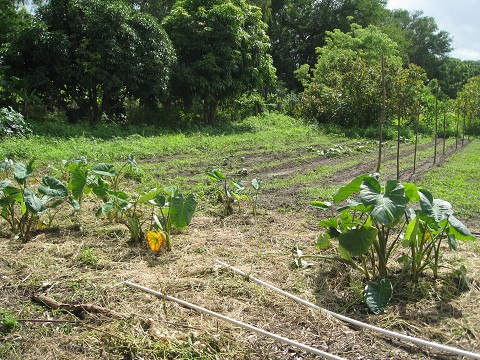Well Done, Good and Faithful Gardener
This week I was assigned work in the garden here at Cicrin. We’d had a garden a couple of times when I was younger, a patch of ground about 8ft by 8ft in my backyard, so I figured I pretty much knew all there was to know about gardening. You dig a few holes, pop in a few seeds, cover them up, sprinkle a little water, and let nature take its course, no?
No. Not in Nicaragua, anyway. And certainly not when the garden covers more land than a little league baseball field. Here, it looks a lot more like: hack down weeds with a machete, cut more weeds with a hoe, pull up any remaining living thing by hand, roll around in the dirt just in case you didn’t already have dirt in every crevice of your body, then come back and do it all again because tomorrow there will be just as many weeds as you started with today.
Welcome to gardening in Nicaragua, or as I call it, Weed Wars. This just in: we’re losing.
Even though at times it may seem hopeless, like we are waging war with a force greater than we are, our master gardener Robert is always there to point out all the work we’ve done that we don’t notice ourselves. He has a habit of coming over, putting his hand over his mouth, and gazing with astonishment and the ground we have reclaimed. Then we have a habit of asking, “Did we do it wrong?”
For some reason, we always feel the need to ask this, even though Robert has never once complained about the work we’ve done for him. On the contrary, he always says he can’t believe how much work we’ve done in such a short time. Then we look back and notice a clear patch of ground or corn stalks growing where weeded days before. Still, each day we are once again sure we have failed him.
Working in the garden, tough and dirty as it is, has taught me the most about how God sees me and the work I try to do for Him every day. Even though I might not think I’m making a significant contribution when I compare it to all the work that is still left to be done, my Master Gardener still looks down, puts his hand over his mouth, and gazes with astonishment at all I have done for Him.
You see, to my human eyes it might look like just another swing of the hoe or another fistful of grass, but to His divine eyes it is another place to plant good fruit; a place that would not have been available if not for that tedious, but diligent, work.
So why do I always feel the need to ask Him if I’m doing it wrong? Why do I always think that the ground I’ve been tirelessly clearing isn’t enough? Why, when I’m doing all I can with what I’ve been given, do I measure my produce against that of someone who has been given more?
When Jesus told the parable of the talents (Matthew 25:14-30), the master rewarded both of the servants who invested what they were given. The master did not turn to the servant who had been given two talents and ask why he had not made as much as the servant who had been given five talents. If he had, the master would have been thought unfair. How could two talents return as much as five talents?
Instead, the master turns to the man and says, “Well done, good and faithful servant.” What’s more, he tells him to “enter into the joy of [his] master.” Not only was his master not disappointed with what he had done, but he was filled with joy and wanted to share it with his servant.
This is what God asks of us: that we do what we can with what we’ve been given, not that we keep up with the best Christian in town. When we live each day for Him, be it witnessing to remote tribes in Africa or crunching numbers in an accounting firm, our Master looks at us with joy and says, “Well done, good and faithful servant.”
